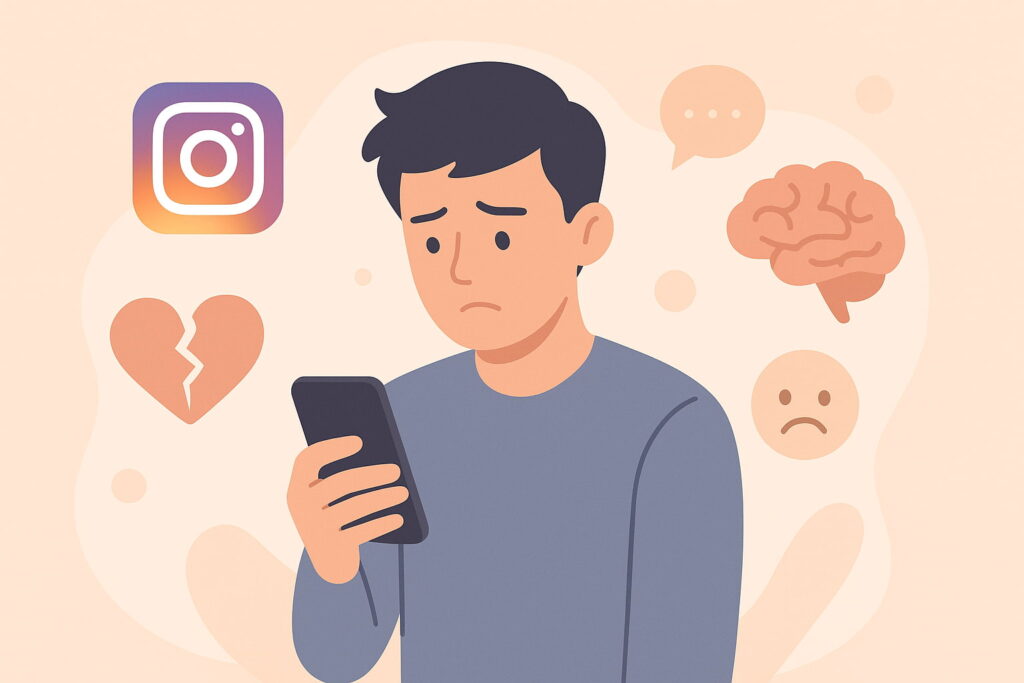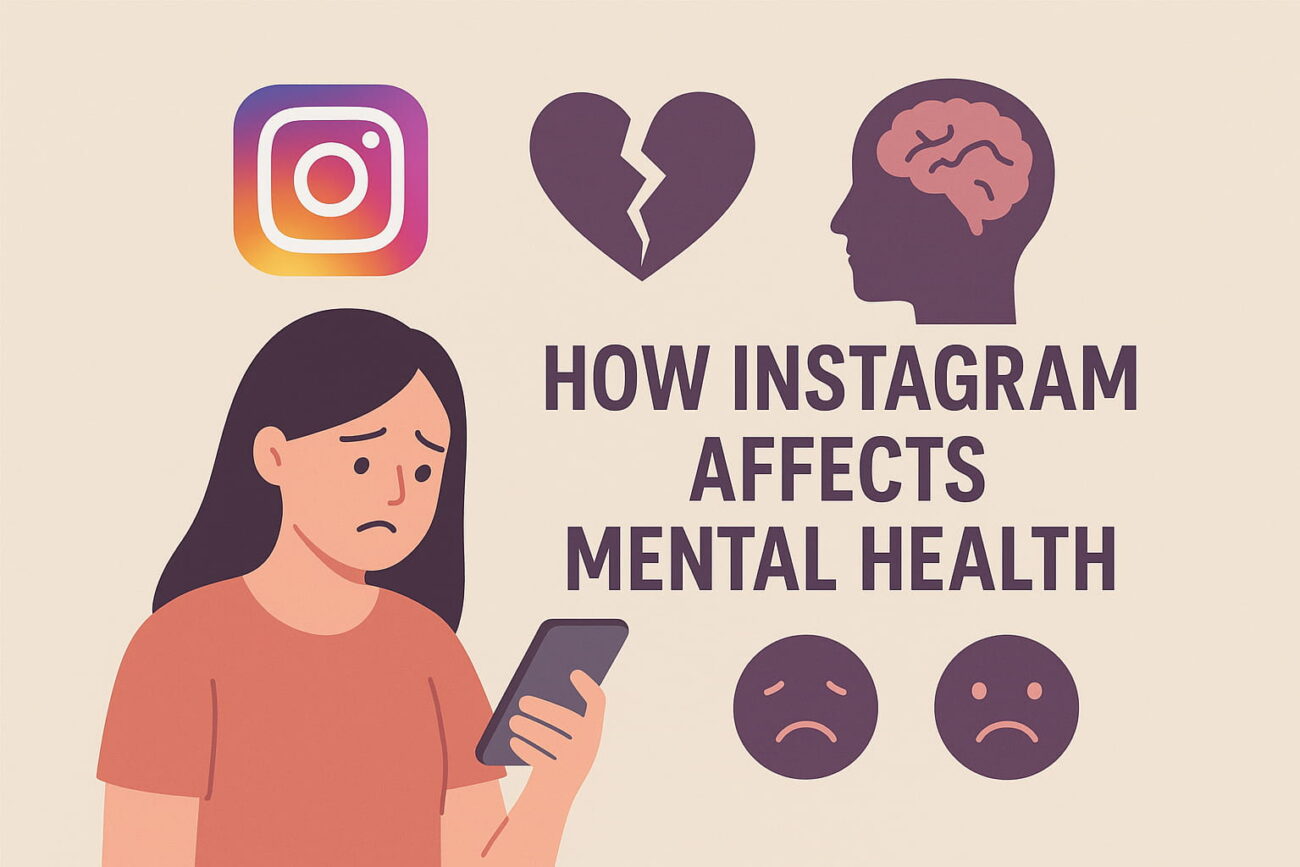In today’s digital world, Instagram is one of the most influential apps, and more than just a photo-sharing app, it has become a place where people can connect, compare, and often measure their worth. While Instagram gives us some entertainment and connection, it also comes with hidden effects on the mind and emotions. the effects of social media on mental health very interictally. Many people wonder about the things that how to improve mental health and ways of boosting mental health. The real truth is, social media and mental health are tightly connected, and apps like Instagram quietly shape the way we think, feel, and see ourselves.
Why Instagram Feels So Addictive
Do you think Instagram was developed only by software developers? The answer is no; it’s a mix of developers and psychologists because Instagram needs to keep you hooked. Every notification, like, comment, or new follower creates a dopamine rush in your brain. Dopamine is the chemical that makes us feel rewarded every time. The more you scroll, the more you want to come back.
But what seems like harmless fun can sometimes create unhealthy mental patterns:
- Constant checking of likes or comments.
- Comparing your lifestyle with others.
- Feeling pressure to post “perfect” photos.
Over time, these habits can lead to anxiety, lower self-esteem, and even depression.
The Hidden Effects of Social Media on Mental Health
Studies found that too much Instagram usage can affect our brains. Let’s look at some common effects:
| Positive Side of Instagram | Negative Side of Instagram |
|---|---|
| Staying connected with friends and family | Anxiety from constant comparison |
| Discovering new ideas, hobbies, or communities | Poor sleep due to late-night scrolling |
| Mental health awareness campaigns | Lower self-esteem from unrealistic standards |
| Finding inspiration (fitness, fashion, art) | Risk of addiction and reduced focus |
While Instagram has benefits, the negative mental health effects often stay hidden until they pile up.
Social Media and Mental Health Awareness
One of the powerful things about Instagram is its ability to spread mental health awareness. Many therapists, doctors, and advocates use Instagram to share tips, break stigma, and encourage open conversations about mental health.
For example:
- Hashtags like #MentalHealthAwareness trend globally.
- Campaigns during Mental Health Awareness Month educate millions.
- Personal stories remind users they are not alone.
So Instagram can be both a tool for awareness and a trigger for struggle depending on how we use it.

The Real Effects of Mental Health Struggles Caused by Instagram
When you constantly compare yourself to the “perfect” lives you see online, it impacts your mental health in subtle ways:
- Anxiety – Always wondering if you look good enough or have enough likes.
- Low self-esteem – Comparing your real life to someone’s highlight reel.
- Sleep problems – Endless late-night scrolling keeps your brain alert.
- Loneliness – Ironically, the more time you spend online, the less time you spend connecting in real life.
- Depression – Studies show heavy Instagram use can increase depressive symptoms, especially in young people.
Simple Things to Improve Mental Health While Using Instagram
The good news? You don’t have to delete Instagram completely. Instead, try small changes to balance your mental health:
- Set time limits → Use Instagram only 30–60 minutes per day.
- Unfollow toxic accounts → If someone makes you feel bad about yourself, hit unfollow.
- Follow positive pages → Mental health, motivation, and real-life content.
- Turn off notifications → Stop the constant dopamine traps.
- Practice gratitude → Remind yourself that your worth is not measured by likes.
- Do digital detoxes → Take 1 day a week off social media.
These are easy steps that genuinely boost mental health without cutting yourself off from the online world.
Why Teens and Young Adults Are at Risk
Nowadaysteenagers are the largest audience on Instagram, and they are also the most vulnerable. At a time when identity and self-image are still developing, Instagram creates a huge pressure:
- Looking “perfect” online.
- Getting enough likes to feel accepted.
- Comparing school life with influencers’ luxury lifestyles.
According to the latest studies, teens who spend over 3 hours per day on social media are more likely to develop anxiety, depression, and poor self-esteem.
Balancing Instagram and Real Life
The goal is not to quit Instagram forever, but to find balance:
- Use it to learn and connect, not compare.
- Treat it as a tool, not a measure of success.
- Follow people who make you feel inspired, not insecure.
How to Boost Mental Health Outside Instagram
If you want to increase mental health in daily life, focus on activities away from screens:
- Exercise (walking, running, yoga).
- Journaling thoughts or practicing gratitude.
- Meditation and mindfulness.
- Spending quality time with friends/family.
- Reading books instead of feeds.
These real-world actions help your mind recover from the constant digital noise.
Frequently Asked Questions (FAQs)
1. How is mental health portrayed on Instagram?
Instagram has both positive and negative sides. While some people spread awareness, positivity, and copying strategies, others may unintentionally promote comparisons, toxic productivity, and life styles. They key is following supportive and credible sources.
2. Can deleting Instagram improve mental health?
The answer is Yes and No, Some studies shows that breaking from Instagram is can reduce comparison, over thinking and anxiety due to doomscrolling. However, the impact depends on how much and how mindfully someone uses the platform.
3. Can Instagram make you feel lonely or more secure?
Both are possible. Instagram can create loneliness due to fear of missing out (FOMO) and comparison, but it can also provide communities and safe spaces that make people feel more secure and understood.
4. How to protect your mental health on Instagram?
- Unfollow accounts that trigger negativity.
- Set screen-time limits.
- Follow positive, educational, and inspiring content.
- Use features like “mute” and “restrict” when needed.
- Take digital detox breaks.
Final Thoughts: Instagram Is a Mirror
Instagram doesn’t create your mental health problems. Instead, it magnifies what you already feel. If you are happy and confident, Instagram can be inspiring and a lot of fun. But if you’re struggling through a bad phase, it can quietly make things worse.
That’s why it’s important to practice self-awareness, limit screen time, and focus on real connections. By doing this, you can easily enjoy Instagram without letting it control your mind and thoughts.
Author : ASIF BC

This really answered my problem, thank you!
Aw, this was a very nice post. In concept I would like to put in writing like this moreover – taking time and precise effort to make an excellent article… however what can I say… I procrastinate alot and certainly not appear to get one thing done.
Whoa! This blog looks exactly like my old one! It’s on a completely different topic but it has pretty much the same page layout and design. Wonderful choice of colors!
I visited a lot of website but I conceive this one has got something extra in it in it